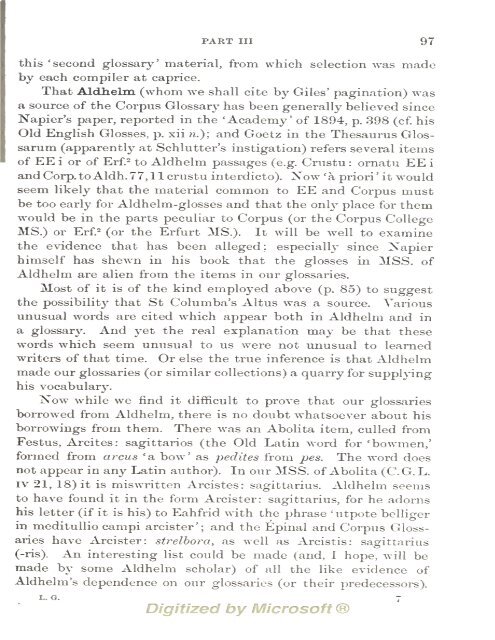the corpus, épinal, erfurt and leyden glossaries, viii - World eBook ...
the corpus, épinal, erfurt and leyden glossaries, viii - World eBook ...
the corpus, épinal, erfurt and leyden glossaries, viii - World eBook ...
Create successful ePaper yourself
Turn your PDF publications into a flip-book with our unique Google optimized e-Paper software.
PART III 97<br />
this 'second glossary' material, from which selection was made<br />
by each compiler at caprice.<br />
That Aldhelm (whom we shall cite by Giles' pagination) was<br />
a source of <strong>the</strong> Corpus Glossary has been generally believed since<br />
Napier's paper, reported in <strong>the</strong> 'Academy' of 1894, p. 398 (cf. his<br />
Old English Glosses, p. xii n.); <strong>and</strong> Goetz in <strong>the</strong> Thesaurus GIos-<br />
sarum (apparently at Schlutter's instigation) refers several items<br />
of EE i or of Erf ^ to Aldhelm passages (e.g. Crustu : omatu<br />
<strong>and</strong> Corp. to Aldh. 77, 1 1 crustu interdicto). Now 'a priori<br />
EE i<br />
'<br />
it would<br />
seem likely that <strong>the</strong> material common to EE <strong>and</strong> Corpus must<br />
be too early for Aldhelm-glosses <strong>and</strong> that <strong>the</strong> only place for <strong>the</strong>m<br />
would be in <strong>the</strong> parts peculiar to Corpus (or <strong>the</strong> Corpus College<br />
MS.) or Erf.2 (or <strong>the</strong> Erfurt MS.). It will be well to examine<br />
<strong>the</strong> evidence that has been alleged; especially since Napier<br />
himself has shewn in his book that <strong>the</strong> glosses in MSS. of<br />
Aldhelm are alien from <strong>the</strong> items in our <strong>glossaries</strong>.<br />
Most of it is of <strong>the</strong> kind employed above (p. 85) to suggest<br />
<strong>the</strong> possibility that St Columba's Altus was a source. Various<br />
unusual words are cited which appear both in Aldhelm <strong>and</strong> in<br />
a glossary. And yet <strong>the</strong> real explanation may be that <strong>the</strong>se<br />
words which seem unusual to us were not unusual to learned<br />
writers of that time. Or else <strong>the</strong> true inference is that Aldhelm<br />
made our <strong>glossaries</strong> (or similar collections) a quarry for supplying<br />
his vocabulary.<br />
Now while we find it difficult to prove that our <strong>glossaries</strong><br />
borrowed from Aldhelm, <strong>the</strong>re is no doubt whatsoever about his<br />
borrowings from <strong>the</strong>m. There was an Abolita item, culled from<br />
Festus, Arcites: sagittarios (<strong>the</strong> Old Latin word for 'bowmen,'<br />
formed from arcus 'a bow' as pedites from pes. The word does<br />
not appear in any Latin author). In our MSS. of Abolita (C. G. L.<br />
IV 21, 18) it is miswritten Arcistes: Sagittarius. Aldhelm seems<br />
to have found it in <strong>the</strong> form Arcister: Sagittarius, for he adorns<br />
his letter (if it is his) to Eahfrid ^^^th <strong>the</strong> phrase 'utpote belliger<br />
in medituUio campi arcister'; <strong>and</strong> <strong>the</strong> Epinal <strong>and</strong> Corpus Gloss-<br />
aries have Arcister: strelhora, as well as Arcistis: Sagittarius<br />
(-ris). An interesting list could be made (<strong>and</strong>, I hope, will be<br />
made by some Aldhelm scholar) of all <strong>the</strong> like evidence of<br />
Aldhelm's dependence on our <strong>glossaries</strong> (or <strong>the</strong>ir<br />
predecessors).<br />
-<br />
L. G.

















